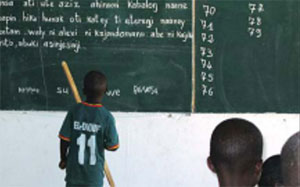The benefits of mother tongue education in Senegal
Rudy Klaas
The benefits of learning in one’s mother tongue are no longer disputed. But is it affordable to implement mother tongue as the first language of learning and teaching for all learners? And if it is, where can one find the necessary expertise and ideas to make it happen? In this article, Rudy shares the story of a mother tongue project in the small village of Diembering, south-west Senegal, which may begin to answer these questions.
Project background
In 1998, school teachers in Diembering attended a mother tongue literacy teacher training event run by SIL International. The teachers then convinced their headteacher to try out the methodology in their school. This first initiative was a success, and convinced parents that their children would learn better in their mother tongue. The mother tongue programme that followed sought to reduce the high failure rates in schools that resulted from students’ poor development of basic literacy skills in their first few years of education. In 2002, the government launched a separate experimental multi-lingual education programme in five locations, including Diembering.
Changes within Diembering school
- 11 out of 18 students who were using mother tongue in all lessons passed their exams. In the two classes using French for instruction, only two and four students respectively out of 20 passed.
- Mother tongue classes are more student-centred, with more use of interactive teaching methods. On-going monitoring shows that students are more confident and enthusiastic.
Differences between Diembering and other schools
Other experimental mother tongue classes in the area were less successful. During my on-going monitoring visits, students, teachers and education officials have suggested reasons for this:
- “They spoke to me in the language I understood”
In addition to using non-local language teaching and learning materials, the Diembering school heavily supplemented the students’ reading with local language materials produced by SIL. - “We had lots of fun things to read in our own language”
SIL supported the creation of a library of mother tongue reading books, folktales, health books, etc, for use by students and the community. Other experimental classes did not have this resource. - “You encouraged us.”
Diembering school staff received support from SIL consultants in literacy and education, while the other schools did not. - “The multi-lingual education training seemed to lack something.”
Some teachers and trainers felt the initial training provided by the government was insufficient, and not followed up with in-service training. Next year, SIL plans to provide monthly in-service training in Diembering so teachers can network and build relationships and discuss successes and challenges. - “We already knew you.”
The community in Diembering already had a strong relationship with SIL linguists and literacy consultants who had lived there for nine years doing research, providing translations and facilitating mother tongue literacy classes, so the idea of mother tongue classes in school was welcomed.
Affordable and worthwhile?
Detailed figures are not available yet on how much the experimental mother tongue classes cost per student. However, these classes in Diembering produced almost four times the level of exam passes than the traditional classes – but certainly didn’t cost four times as much to run. So the mother tongue class approach is clearly worthwhile.
The cost of producing traditional class books is not that different from producing the same book translated into a mother tongue. Translation costs don’t have to be high either; some work can be done voluntarily, if time is taken to find motivated translators.
Students from mother tongue classes often complete their learning goals faster than those in traditional classes. This can reduce overall education system costs, especially if it reduces the number of students who repeat years.
We need to think:
If a country spends less money on education that doesn’t work, it costs them more in the long term than if they spend more money on education that does work!
Contact
Rudy Klass
SIL – Klaas
BP 2075
Dakar
Senegal
Email: Rudy_Klaas@sil.org

Reading Kwatay
